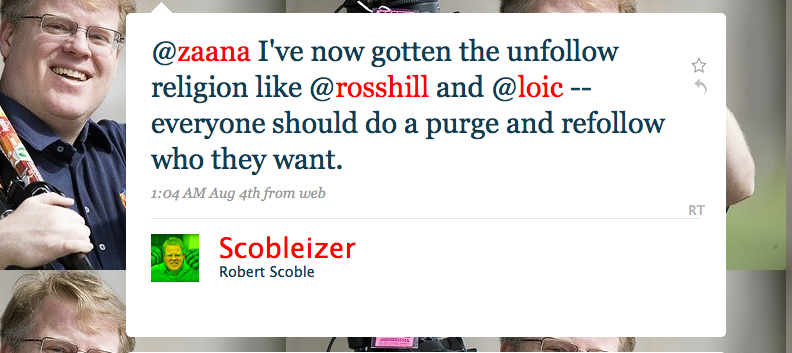
There is an old story about a construction worker named Bob, who regularly brought his lunch to work. However, everyday he complained profusely about the contents of his lunch box.
"A turkey sandwich again," he remarked one day, "I hate turkey sandwiches!"
After hearing his daily complaints, one of his coworkers piped in, "Bob, for crying out loud. I can't stand hearing you complain everyday. Just tell your wife to make you other food if you hate turkey sandwiches so much."
To which Bob replied, "Wife? I live alone, and make my own lunch."
I thought of this story recently when reading that tech blogger and ultra geek Robert Scoble, who was following over a whopping 100,000 (not a typo) users on Twitter decided (at last) to dump them all, and only add those of interest. He essentially realized that he could make his own lunch -- and pick the users he wanted to follow. 
Though few of us likely follow such a large number, any of us on Facebook and Twitter face the question:
When do we decide to unfollow or no longer receive another user's updates?
Here are my top three reasons:
1. Update Overload
Hold Back on the Posts, Please!
I want to know what people are doing and thinking, but I do not want to hear every little thing. If someone discovers fifteen news items a day, I would rather they put some time and thought into choosing the best three to post, instead of submitting all fifteen.
Short updates (or tweets) on social networks like Twitter allow us to do something quite phenomenal: we can now quickly and easily transfer small amounts of data from our mind into someone else's. Large numbers of tweets often reveals that someone gives little consideration to this privilege, and as a result easily overwhelms others with information.
I generally find that if a person regularly posts more than five times a day, it is more information than I am interested in consuming, and I tend to inflow.
2. Lack of Relevancy
Hey, That's My Mind Your Putting Stuff Into!
The second is relevancy. I was following a person on Twitter some time back who had some interesting posts, but then decided to include a picture of every meal she was eating for an entire week. Other users may have enjoyed this, but I was not interested and not willing to sift through all the food posts to find ones I enjoyed.
I often notice this is the case with a user when I find myself scanning over and not actually reading his or her updates. Rather than continuing to take the time to ignore the person's tweets, I unfollow.
3. Excessive Self-Promotion
I Know You Think That Are Wonderful, but . . .
It is one thing to occasionally link to a product, event, article, or other piece of information that one either created or benefits from, but it is quite another when this becomes a user's primary focus.
Some people view social networks strictly as a marketplace, and themselves as promoters. Of course, social networks have an element of a marketplace, but they are also communities, and shunning the community aspect is like showing up to a party the last ten minutes just for the chance to win a door prize -- with no interest in learning about or engaging with those at the party.
Some tweets about oneself and personal projects are fine to me, but when they become the majority of one's posts, I tend to unfollow.
Conclusion
The point of unfollowing is not to judge or criticize other users -- if someone wants to post pictures of what they eat every meal or of their dog's poop, fine by me. I will likely choose not to consume them, but people can do as they please. In this sense, there is no inherently "good" or "bad" posts, but there are those that are "more relevant" and "less relevant" to us at a given time.
The art of unfollowing, then, is a way of valuing our time, interests, and goals. The good news is that every time we recognize and act on this, we have more time to find and follow people with which we have greater alignment and shared interests.
Every unfollow or "no" in this sense is also a "yes" - a yes to those users where there is a connection, and a yes to making our time on social networks more effective and enjoyable.
***
Soren Gordhamer is the author of Wisdom 2.0: Ancient Secrets for the Creative and Constantly Connected (HarperOne, 2009). Website: http://www.sorengordhamer.com